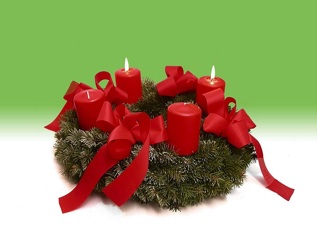
On Mindful Monday, my readers and I practice the art of pausing, TRYING to be still, or considering, ever so briefly, the big picture. We’re hoping this soul time will provide enough peace of mind to get us through the week!
I think I know why I love the Advent season. It has nothing to do with the wreaths or the poinsettias, or the unexpected chocolates that arrive in the mail. Advent, which means “arrival” is the time of waiting, of expectancy, of becoming alert. Jesuit Father Alfred Delp described Advent as a time of being “deeply shaken” so that we will wake up to ourselves. He writes:
The shaking is what sets up the secret blessedness of this season and enkindles the inner light in our hearts, so Advent will be blessed with the promises of the Lord. … It is precisely in the severity of this awakening, in the helplessness of coming to consciousness, in the wretchedness of experiencing our limitations that the golden threads running between heaven and earth during this season reach us; the threads that give the world a hint of the abundance to which it is called, the abundance of which it is capable.
Man is that true: in the helplessness of coming to consciousness, in the wretchedness of experiencing our limitations that the golden threads running between heaven and earth during this season reach us.
That’s why I love advent: because we are told to live like we have depression–to be alert and careful and awake and shaken up–to not fall asleep on the job, and to let our anxiety work for us. It’s a season that’s difficult for the depressive: all the joy we are supposed to be feeling, all the parties we are supped to be enjoying, all the extra responsibilities that are supposed to be fun.
But if you think hard about what the season of Advent really means, we depressives are naturals at Advent, because we live every day of the year in Code Orange and Code Red–paying attention to absolutely everything that could potentially bring us down, and into a dangerous state.
I don’t know about you, but I get a little sick of having to be so alert all the time. And yet, when people make comments like “I wish I were as disciplined about my exercise like you,” or “How have you been able to not drink for 20 years?” I somewhat appreciate the fact that, unlike my friends who can be lazy if they want to, I don’t have a choice. I have to work at my mental health program. Every hour. Every day. Every season. Or else everything in me will wither.
For me, it’s always Advent. A suspense in the air: Yikes, what’s coming next? Forever expecting the unexpected, and pleasantly surprised with no surprise. And yet it’s that suspense, that permanent awareness–the wretchedness of my limitations, as Delp describes–that does hold “the golden threads running between heaven and earth.”
Why? The German Benedictine Sister Aemiliana Lohr says this:
[Advent] turns one to face the unknown, the coming, bringing him out of himself and his usual way on to a higher level of being, nearer to the fulfillment of his human essence … when God appears….This is what makes it terrifying and the source of happiness; God’s coming is what man most fears and most seeks: it is the death of selfhood, the entrance of new life in God.
My translation: The depressive, and those who struggle with any chronic illness, especially chronic pain, have four bars of reception on the God phone, instead of two. Because in their sacrifice–even if they don’t want to sacrifice, as I don’t almost everyday–something is made holy … they are better able to turn away from themselves–or at least see that they don’t hold all the answers–and can better recognize God’s presence in their life. Some days, they can even walk toward it in joy.
To read more Beyond Blue, go to http://blog.beliefnet.com/beyondblue, and to get to Group Beyond Blue, a support group at Beliefnet Community, click here.

